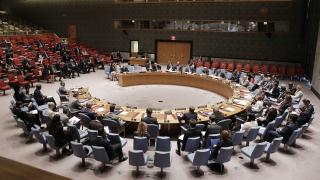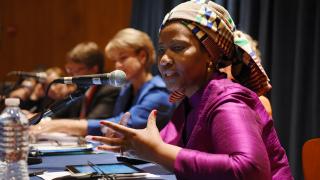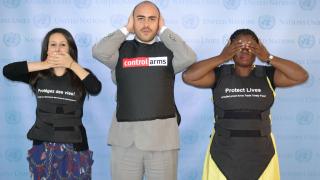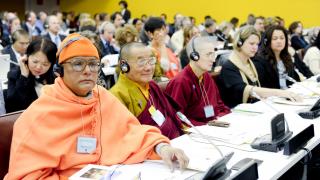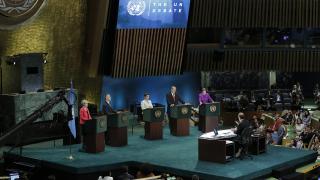
Volker Lehmann, Senior Policy Analyst, Friedrich-Ebert-Stiftung in New York
When the General Assembly took the historic decision to hold the first ever hearings with all candidates for the post of Secretary-General (SG), many observers expected a dreadful exchange of prefabricated slogans. Instead, the hearings, which started in April 2016, became widely regarded as perhaps the most honest, open exchange about the role of the SG and the UN that the world body had ever seen.
A significant contribution to the selection process’ increased transparency was the questions put by NGOs from all over the world to all candidates. The President of the General Assembly had agreed to make these interventions a short, yet constituent, part of all candidate hearings. NGO participation was facilitated by a civil society committee balanced in respect to gender and region – organised by the UN Non-Governmental Liaison Service (NGLS) – that made pre-selections from among the over 1,500 civil society questions submitted from 100 countries. As a result, during their dialogue with General Assembly members, each candidate was presented with two to three civil society questions by pre-recorded video message.
The hearings became widely regarded as perhaps the most honest, open exchange about the role of the SG and the UN that the world body had ever seen.
Civil society participation in the selection process has established an important precedent. But there is more to be learned from this exercise:
First, regarding the selection of the civil society questions, the crowd wisdom of the 22 civil society committee members managed to balance representativeness and the selection of pertinent content. Yet this also came at the price of a certain level of self-censorship: future debates would profit if civil society concentrated on raising issues that member states would be unlikely to cover or do not dare to address themselves.
Second, technology can help in overcoming distances, language barriers and other divisions, but only to a point. The pre-recorded video messages helped bring voices to the UN with relatively little effort. But these questions, which had to be submitted and filmed beforehand, took away the spontaneity and they are no substitute for a genuine debate on the spot. The UN should further explore the many novel methods of interaction that communication technologies present. For instance, the UK Mission collected civil society questions via Twitter and then addressed some of them to the candidates. This could be done by the UN Secretariat as the conference convener in many of its future UN hearings, as well as in anticipated hearings with SG candidates.
Third, the standing of NGLS within the UN system has always been indicative of the general state of the UN-civil society relationship. Civil society participation in the SG hearings profited from the experience that NGLS had built up funnelling civil society participation into the deliberations for the 2030 Agenda. Nevertheless, NGLS’s financial and institutional standing remains in peril and could deteriorate further without strong support from member states and the Secretariat.
While constantly pushing the envelope and moving towards constructive involvement for the greater global good, in the end CSOs cannot do it alone. The proactive role of the President of the 70th General Assembly, Mogens Lykketoft, proved crucial in creating transparent candidate hearings with civil society input. Secretary-General Guterres could seize upon the worldwide interest in his selection that global civil society took and invite them to become an integral part of broad coalitions to reinvigorate the UN and tackle the huge challenges ahead.
About the author
Volker Lehmann is a Senior Policy Analyst with the New York office of the Friedrich-Ebert-Stiftung. He focuses on the UN’s role in international peace and security and on UN reform. He was a member of the NGLS civil society committee.
Photo: Global Townhall with UN Secretary-General Candidates, broadcast live from New York headquarters by Al Jazeera. Copyright UN Photo/Evan Schneider


